This article was co-authored by Amber Rosenberg, PCC. Amber Rosenberg is a Professional Life Coach, Career Coach, and Executive Coach based in the San Francisco Bay Area. As the owner of Pacific Life Coach, she has 20+ years of coaching experience and a background in corporations, tech companies, and nonprofits. Amber trained with the Coaches Training Institute and is a member of the International Coaching Federation (ICF).
This article has been viewed 64,126 times.
Sometimes it can be a challenge determining how to effectively use your time productively. This is especially true when considering all the things that you need to juggle throughout your day. However, successful people know the importance of mastering how to use their time productively. Knowing how to plan a productive day will help you maximize your results.
Steps
Organizing Your Time
-
1Start off each day by planning your day. One of the very first things you’ll want to do each morning is to spend 30 minutes planning out your day. Commit to not starting your day until you have planned it out.[1]
-
2Invest in a day planner. Nothing is more important in improving productivity than creating a plan for how you will use your time each day. Planning helps reduce stress, build confidence and improve your ability to plan for the unexpected. A day planner is an excellent tool to assist you in increasing productivity by strategically determining how much time to spend on various activities. effectively managing your time each day.
- Choose a planner that best meets your needs and preferences. You might prefer to use an online daily planner or download a daily planner app. You can also purchase a paper based daily planner that you can physically carry around with you in your purse or pocket.
Advertisement -
3Distinguish between obligatory and discretionary time. In any given day, you’ll already have a certain number of hours that are automatically committed to various tasks and activities, such as sleeping and driving to and from work and school. This is your obligatory time. Using your day planner, write down all of times and places of where you need to be. The time remaining will be your discretionary time, or ‘real time” that you can actually manage and control.[2]
Determining Your Priorities
-
1Make a to-do list. There are so many things that you have in your mind that you would like to accomplish. Instead of trying to remember it all, take time to write them all down in a to-do list. You can write a simple bulleted list of all the activities, conversations, meetings and errands that you would like to complete.[3]
-
2Create a priority list. Now that you’ve completed a to-do list, you need to prioritize each item on the list. Prioritizing is crucial in ensuring that you are tending to the most import and urgent matter first. An example would be setting priorities during tests and examination times. No point in spending hours cleaning up the apartment when the same time can be used to prepare yourself adequately for the tests, interview etc.[4]
- To create your priority list, go back to your to-do list. Next to each item, put an “A” next to things that must be done today, a “B” for things that should be done, and “C” beside things that could be done. You would then focus your attention on completing everything that must be done and completing as many of things that should be done. The "could be done" items are simply optional.
- It might be helpful to create some high priority items based on your short-term goals. Many of your short-term goals will most likely be your top main objectives at the moment.
-
3Allocate time for your most important activities and conversation. You haven’t truly committed to completing high priority activities until you’ve committed to a specific time to get it done. You need to allocate time to any activity that you’ve determined must be completed in your day.[5]
Remaining Focused
-
1Limit social media usage. Social media can be a major distraction in achieving a productive day. As a result, make sure you establish clear time restrictions for accessing social media websites. Consider using a timer to assist you in honoring the time limits you have set for social media interaction. In addition, limit the number of social media accounts that you have to further reduce excessive use of social media.[6]
-
2Silence your cell phone while working. Cell phone usage is also a major distraction in maintaining a focused and productive day. The various audible alerts and notifications can pull you away from completing the important tasks and priorities of the day. Eliminate this distraction by simply muting your cell phone when you need to be working productively.[7]
-
3Complete one task at a time. It might seem like juggling multiple tasks makes your more productive, but it actually causes many people to feel overwhelmed and burned out. In addition, your productivity is reduced because you are never being fully engaged in completing any one activity.[8] Focus on completing one thing at a time to improve your chances of successfully completing each individual task.
- Try and set a specific amount of time to work on each separate tasks. You can reduce the temptation to work on other things by removing from your workspace any material and items not related to the task at hand.
Maximizing Your Success
-
1Avoid procrastinating. Sometimes it’s hard to honor the time commitments you’ve made to complete various priorities. There are probably a lot more things you would rather do with your time than fulfilling obligations. However, honor completing your high priority items by setting strict time limits and sticking to them.
- Set an alarm or alert to help you keep track of time. You can also simply write the times down and post it where easily visible.
-
2Monitor and evaluate your progress. An important part of maximizing your daily productivity is monitoring and evaluating your effectiveness. Throughout your day, actively take time to think about the objectives you’ve set for the day. Consider writing a short list to remind yourself of your goals and your progress in completing them.[9]
- You might need to consider changing a goal if you find that you’re continually veering away from the goal. Allowing for flexibility in goal setting is necessary in achieving optimal success.[10]
- There are a number of questions that you can ask yourself to assist you in monitoring and evaluating your progress. Ask yourself: What am I doing well? What can I improve? What is hindering my success?
-
3Take pride in checking off items on your to do list. It’s important to give yourself a pat on the back as you successfully complete items on your to list. This will help keep you motivated. As you complete task throughout your day, take time to sit back and feel proud of all the check marks you have added to your ever decreasing to do list.
-
4Incorporate breaks and rewards in your day. Your brain needs time to process and rejuvenate after engaging in tasks that require your energy, focus and attention. Avoid working on important tasks for longer than two hours at a time without taking a break. You can keep the breaks short, even as short as five minutes. Reward yourself during breaks. Grab a quick snack during your short five-minute break, and do something enjoyable during your longer break. You’ve earned it.
- Incorporate a couple of recreational hours into your weekly schedule to celebrate the completion of a productive week. Spend those hours doing something you really enjoy like going to the movies, hanging out with your friends during happy hour, or treating yourself to a good meal.
-
5Delegate smaller obligations to others when possible. Delegation is oftentimes an underused strategy in using time productively. When you delegate task to others, it allows you to focus your energy on where it is most required and is most useful. For example, you can have your children do the prep work for dinner, such as washing and cutting up vegetables, and that will allow you to finish your cooking sooner once you get home.
-
6Seek out the wisdom and experience of other successful people. Emulation is the sincerest form of flattery. Look at the lifestyles and mannerisms of successful role models. Adopt and try to learn from their successful behaviors.
- Try and schedule a time to sit down with a role model to discuss how they’ve been successful in prioritizing and achieving their goals on a regular basis.
-
7Let go of perfectionism. While it’s important to take pride in your work, it’s important to recognize that you don’t have to complete everything perfectly. In fact, attempting to complete everything in your day to perfection may actually lead to procrastination; you might procrastinate as a way of not facing the fear you have of not completing the task perfectly.[11]
- One way to manage your fear of not completing a task perfectly is to assess the risk of the task. Ask yourself, “What will I gain or lose if I spend more time completing this task perfectly?” If you determine that the gain isn’t worth the extra time and effort, then move on to your next action item.
Expert Q&A
-
QuestionWhat is the best way to utilize your time?
 Amber Rosenberg, PCCAmber Rosenberg is a Professional Life Coach, Career Coach, and Executive Coach based in the San Francisco Bay Area. As the owner of Pacific Life Coach, she has 20+ years of coaching experience and a background in corporations, tech companies, and nonprofits. Amber trained with the Coaches Training Institute and is a member of the International Coaching Federation (ICF).
Amber Rosenberg, PCCAmber Rosenberg is a Professional Life Coach, Career Coach, and Executive Coach based in the San Francisco Bay Area. As the owner of Pacific Life Coach, she has 20+ years of coaching experience and a background in corporations, tech companies, and nonprofits. Amber trained with the Coaches Training Institute and is a member of the International Coaching Federation (ICF).
Pacific Life Coach It depends on whether you're asking about your free time or your work time, but it's important to prioritize the most important and time-sensitive tasks. Figure out what you absolutely must do and then add a little extra time to give yourself a cushion. Factor in things like travel or preparation. By breaking down your schedule and prioritizing the most important tasks, you'll be more efficient.
It depends on whether you're asking about your free time or your work time, but it's important to prioritize the most important and time-sensitive tasks. Figure out what you absolutely must do and then add a little extra time to give yourself a cushion. Factor in things like travel or preparation. By breaking down your schedule and prioritizing the most important tasks, you'll be more efficient.
References
- ↑ https://www.entrepreneur.com/living/10-time-management-tips-that-work/299323
- ↑ https://www.psychologytoday.com/blog/communication-success/201206/how-be-ultra-productive-10-tips-mastering-your-time
- ↑ Amber Rosenberg, PCC. Life Coach. Expert Interview. 26 February 2019.
- ↑ Amber Rosenberg, PCC. Life Coach. Expert Interview. 26 February 2019.
- ↑ https://www.entrepreneur.com/living/10-time-management-tips-that-work/299323
- ↑ Amber Rosenberg, PCC. Life Coach. Expert Interview. 26 February 2019.
- ↑ Amber Rosenberg, PCC. Life Coach. Expert Interview. 26 February 2019.
- ↑ https://hbr.org/2012/03/the-magic-of-doing-one-thing-a.html
- ↑ http://literacy.kent.edu/salt_fork/time_priority/prioritize/monitor.html
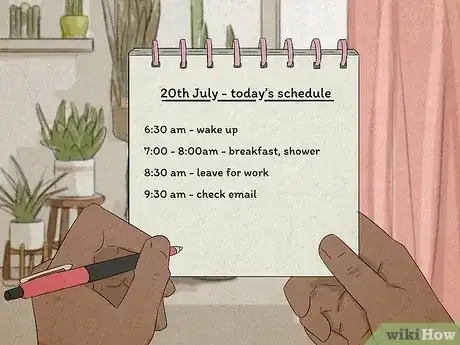
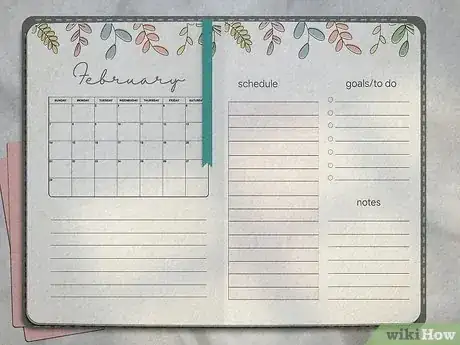
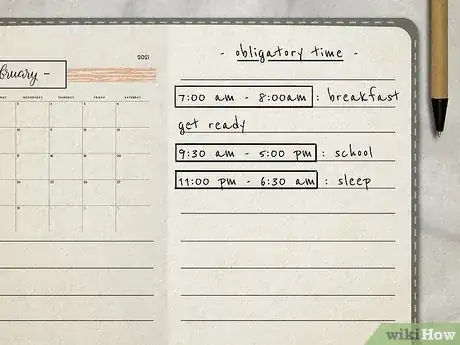
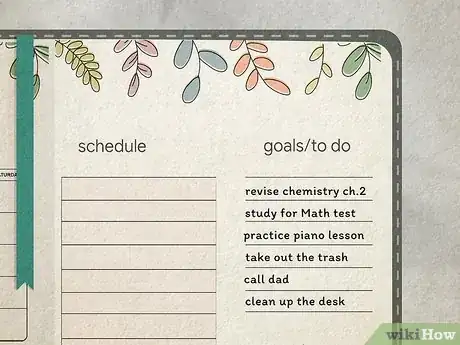

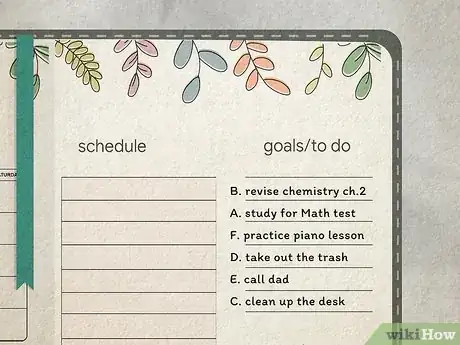
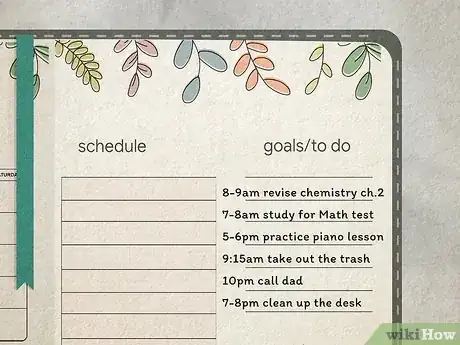





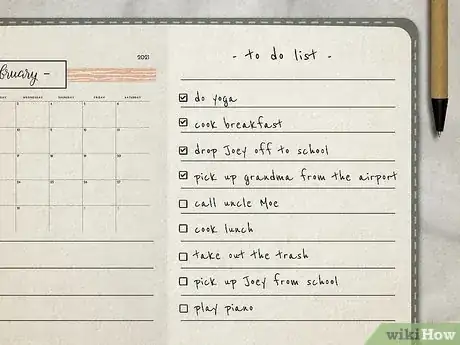









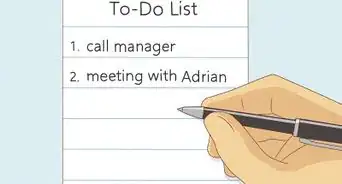


-Step-8.webp)



















































